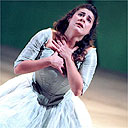
Curious the vituperation with which the new production of Aida was received at Covent Garden the other night. Opera audiences, as you know, enjoy a licence to be rude that elsewhere in the theatre would be considered bizarre, so the man who, when the curtain came down, shouted from the back of the stalls "Take it back to Brussels where it belongs!" was not considered to be behaving in an unseemly fashion. Indeed, he spoke for many. He spoke, I estimated, for about half the audience.
Robert Wilson, the director whose work had so irritated the booers, is a grown man who can look after himself (does so, as far as I know, very well), and it is not that I feel in the least outraged on his behalf.
But it was not a bad production - indeed, the concession some people have made, that at any moment the stage looked beautiful, is to my way of thinking a large one. Since Wilson takes credit for direction, sets and lighting, success in the visual department is no trifling matter.
What seemed to have annoyed people was a quality in the acting and movement that, excluding naturalism, embraced the hieratic as a governing idiom. Groups moved as on a freeze. Individuals were aware of each other without turning to face each other. Hand gestures were Egyptian, or Balinese, or in some way oriental.
I don't necessarily want to see La Bohème done this way, but for every opera that calls for naturalism there must be 100 in serious need of something else. A voice in the interval was complaining just behind me: "I mean, he's just come back from the war, he hasn't seen her for two years, she hasn't seen him - she doesn't look at him, she doesn't seem pleased..." I thought to myself: Yes, but they're Ancient Egyptians. Surely they can be allowed to preserve a little of their ancient mystery.
It's by no means the first occasion in recent seasons that the reaction of audience and critics seemed out of proportion to the offence given. There was La Sonnambula, whose first act, quite ingeniously devised, was already provoking derision, long before an avalanche struck the hotel in which the production had been mounted. On this night it turned out that those of us who had not read a pretentious programme note by the director had the advantage over those who had.
They were seething with outrage, because their heads were full of the words of Marco Arturo Marelli (once again: direction, sets and lighting) who had noticed that the name of the heroine, Amina, is an anagram of Anima. We, who were unaware of the Jungian analysis set forth in the programme, were enjoying Juan Diego Flórez and Elena Kelessidi.
Then there was a Haydn opera of no great intrinsic dramatic interest, put across with a genial and at least inoffensive absurdism, the point of which was to hear Haydn sung by Cecilia Bartoli. From the critical response on that occasion I took the following lesson: that there are people out there in the world who have seen too much opera, in too many bad-to-medium productions, and who really ought, for their own health, to give it a rest.
It is true, though, that much opera production is bad. Indeed it is quite possibly true that the opera-lover in London would do better to concentrate on going to concert performances at the Barbican, rather than spending lavishly on Covent Garden, or putting up with the very confusing Trojans or the unbearable Handmaid's Tale at the ENO.
The Pappano regime (Pappano was conducting Aida) is fallible, and has given us nothing since, by way of production, to match the outstanding Ariadne auf Naxos in September last year (directed by Christof Loy and designed by Herbert Murauer). Still, the place does feel like a professionally run opera house, and not like a professionally run disgrace.
The audience, with their exhibitionist enthusiasts (in with a premature Brava! as the aria draws to a close), and their demonstrations of outrage (almost exclusively reserved for the production teams), remind me of the English abroad - people who read years ago that French waiters are to be called "Garcon!" (at the top of the voice) and that bottles of wine are to be sent back as being corked. They are keen displayers of discriminations they have yet to attain.
I wish they would shut up. It's a long time since I've been to an Italian opera house, but, even if it were true that this is the way the Italians behave, wouldn't there be a case for behaving better? Better to sit on your hands and nurse a secret sorrow, in my view, than behave like an opinionated fool.

